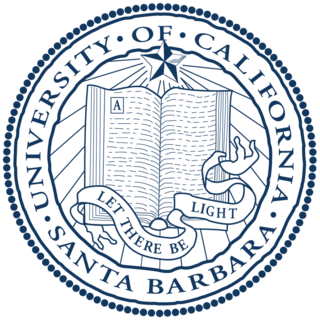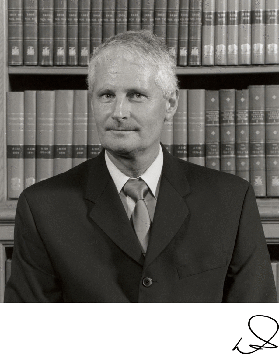Related Research Articles

The University of California, Santa Barbara, is a public land-grant research university in Santa Barbara, California, United States. It is part of the University of California university system. Tracing its roots back to 1891 as an independent teachers' college, UCSB joined the ancestor of the California State University system in the 1920s and then moved over to the University of California system in 1944. It is the third-oldest undergraduate campus in the system, after UC Berkeley and UCLA. Total student enrollment for 2022 was 23,460 undergraduate and 2,961 graduate students.

Carl Edwin Wieman is an American physicist and educationist at Stanford University, and currently the A.D White Professor at Large at Cornell University. In 1995, while at the University of Colorado Boulder, he and Eric Allin Cornell produced the first true Bose–Einstein condensate (BEC) and, in 2001, they and Wolfgang Ketterle were awarded the Nobel Prize in Physics. Wieman currently holds a joint appointment as Professor of Physics and Professor in the Stanford Graduate School of Education, as well as the DRC Professor in the Stanford University School of Engineering. In 2020, Wieman was awarded the Yidan Prize in Education Research for "his contribution in developing new techniques and tools in STEM education." citation.

Eric Allin Cornell is an American physicist who, along with Carl E. Wieman, was able to synthesize the first Bose–Einstein condensate in 1995. For their efforts, Cornell, Wieman, and Wolfgang Ketterle shared the Nobel Prize in Physics in 2001.

Catherine Evelyn Starbird is an American computer scientist and former professional basketball player.

William Richard Dickinson was a professor emeritus of geoscience at the University of Arizona and a member of the U.S. National Academy of Sciences. Prior joining the University of Arizona, Dickinson was a professor at Stanford University. He joined the U of A faculty in 1979.
The Presidential Early Career Award for Scientists and Engineers (PECASE) is the highest honor bestowed by the United States federal government on outstanding scientists and engineers in the early stages of their independent research careers. The White House, following recommendations from participating agencies, confers the awards annually. To be eligible for a Presidential Award, an individual must be a U.S. citizen, national, or permanent resident. Some of the winning scientists and engineers receive up to a five-year research grant.

The Association of American Universities (AAU) is an organization of American research universities devoted to maintaining a strong system of academic research and education. Founded in 1900, it consists of 69 universities in the United States and two universities in Canada. AAU membership is by invitation only and requires an affirmative vote of three-quarters of current members.

David Haussler is an American bioinformatician known for his work leading the team that assembled the first human genome sequence in the race to complete the Human Genome Project and subsequently for comparative genome analysis that deepens understanding the molecular function and evolution of the genome.
The Universities Research Association is a non-profit association of more than 90 research universities, primarily but not exclusively in the United States. It has members also in Japan, Italy, and in the United Kingdom. It was founded in 1965 at the behest of the President's Science Advisory Committee and the National Academy of Sciences to build and operate Fermilab, a National Accelerator Laboratory. Today, the mission of URA is "to establish and operate in the national interest unique laboratories and facilities for research, development, and education in the physical and biological sciences to expand the frontiers of knowledge, foster innovation, and promote the education of future generations of scientists."
The Searle Scholars Program is a career development award made annually to support 15 young faculty in biomedical research and chemistry at US universities and research centers. The goal of the award is to support to exceptional young scientists who are at the beginning of their independent research careers and are working in the fields of medicine, chemistry, and/or biological sciences.

Anthony Glyn Evans was Alcoa Professor of Materials, professor of Mechanical Engineering, director of the Center for Multifunctional Materials and Structures and co-director for the Center for Collaborative Engineering Research and Education at the University of California, Santa Barbara, United States.
The Richtmyer Memorial Award is an award for physics education, named for physicist Floyd K. Richtmyer and given annually by the American Association of Physics Teachers. Its recipients include over 15 Nobel Prize winners.
Charles Musgrave is an American chemist, engineer and materials scientist. He won the 1993 Foresight Institute Feynman Prize in Nanotechnology.
ARCS Foundation, Inc. is an American nonprofit volunteer women's organization that promotes US competitiveness by providing financial awards to academically outstanding US citizens studying to complete degrees in science, technology, engineering, mathematics (STEM), and health disciplines at 49 of the nation's leading research universities. The organization has awarded more than $115 million to 10,000 scholars since 1958. ARCS Foundation Scholars have produced thousands of research publications and patents, secured billions in grant funding, started science-related companies, and played a significant role in teaching and mentoring young people in the STEM pipeline.
Noah David Finkelstein is a professor of physics at the University of Colorado Boulder. He is a founding co-director of the Colorado Center for STEM Learning, a President’s Teaching Scholar, and the inaugural Timmerhaus Teaching Ambassador. His research focuses on physics education and on developing models of context, the scope of which involves students, departments, and institutional scales of transformation. In 2010, Finkelstein testified to the United States House Committee on Science, Space and Technology on how to strengthen undergraduate and postgraduate STEM education.

Michael Stewart Witherell is an American particle physicist and laboratory director. He has been the director of the Lawrence Berkeley National Laboratory since 2016. Witherell, a particle physicist, previously served as Director of Fermilab. He previously served as professor and vice chancellor for research at the University of California, Santa Barbara.
Lisa Dilling is an interdisciplinary scholar who focuses on the energy transition, climate adaptation, decision making, the use of information, and science policy. She aims to improve the effectiveness of policies for climate change. Dilling is a Professor of Environmental Studies at the University of Colorado, Boulder, a Fellow of the Cooperative Institute for Research in Environmental Sciences (CIRES), a member of the Center for Socio-Environmental Futures (C-SEF), and former Director of the Western Water Assessment (WWA).
The Camille Dreyfus Teacher-Scholar Awards are awards given to early-career researchers in chemistry by The Camille and Henry Dreyfus Foundation, Inc. "to support the research and teaching careers of talented young faculty in the chemical sciences." The Dreyfus Teacher-Scholar program began in 1970. In 1994, the program was divided into two parallel awards: The Camille Dreyfus Teacher-Scholar Awards Program, aimed at research universities, and the Henry Dreyfus Teacher-Scholar Awards Program, directed at primarily undergraduate institutions. This list compiles all the pre-1994 Teacher-Scholars, and the subsequent Camille Dreyfus Teacher-Scholars.
References
- ↑ "Alumnus Profile: Michael McGehee, Ph.D. 1999". University of California, Santa Barbara. 26 January 2016. Retrieved 3 November 2023.
- ↑ "Michael D. McGehee". University of Colorado Boulder.
- ↑ "McGehee Group Contact Information". Stanford University. Retrieved 3 November 2023.
- ↑ "McGehee Group (Stanford Homepage)" . Retrieved 3 November 2023.
- ↑ "Mike McGehee". University of Colorado Boulder College of Engineering and Applied Sciences. Retrieved 3 November 2023.
- ↑ "McGehee Research Group". University of Colorado Boulder. Retrieved 3 November 2023.